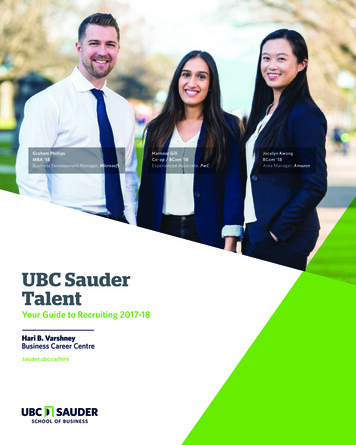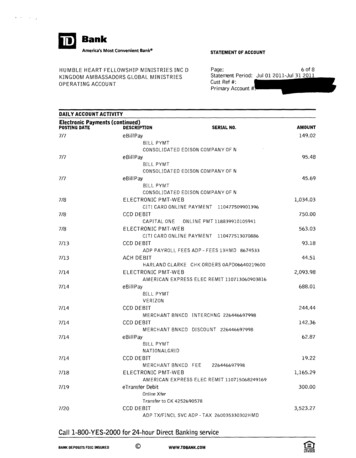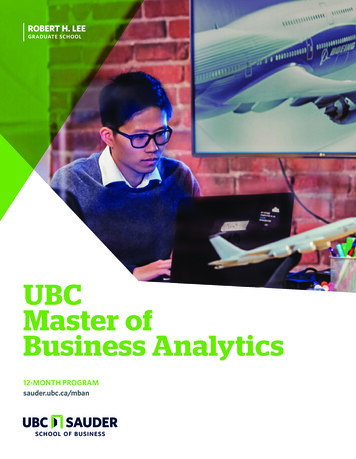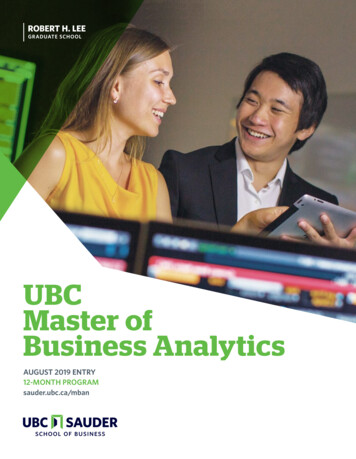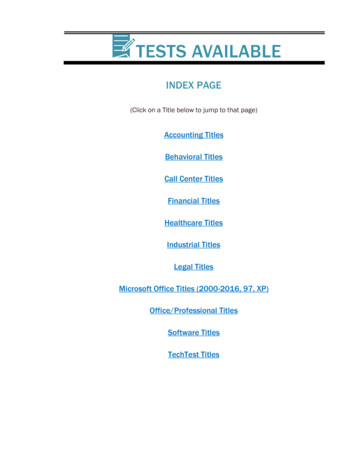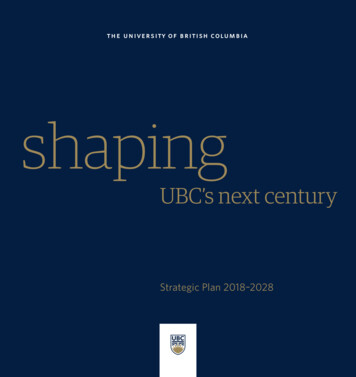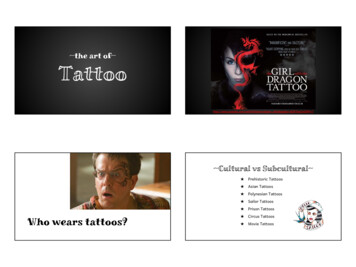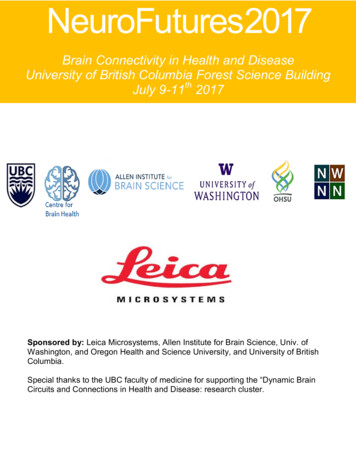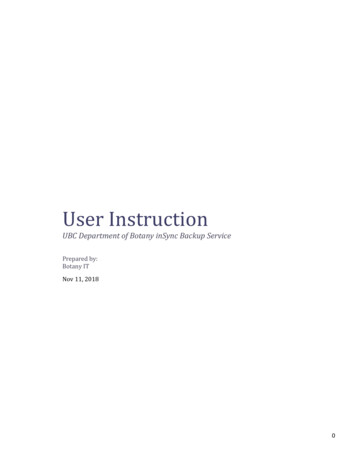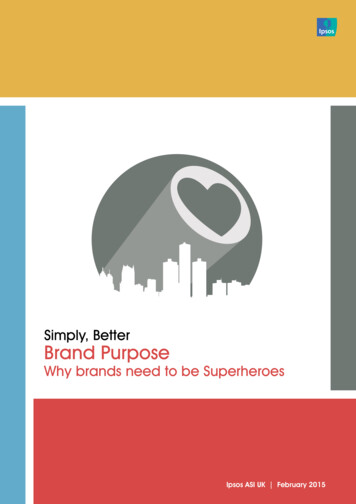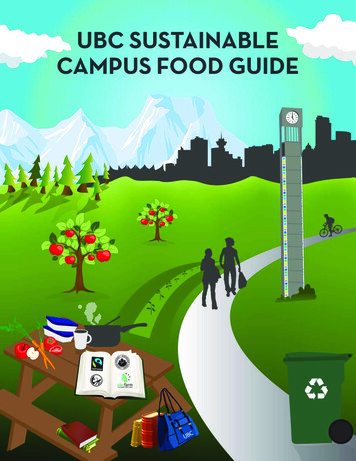
Transcription
UBC’s First Food GuidePurpose StatementThe UBC Campus Sustainable Food Guide aims to raise awareness of and facilitate participation in sustainable foodsystem initiatives on campus among the UBC community (students, faculty, staff and residents).What Is A Sustainable Food System?With input from over 10 generations of students, faculty and staff, the UBC Food System Project has developed a visionfor what a utopian sustainable UBC food system would look like.A Utopian UBC Food SystemA sustainable food system meets the needs of the present generation without compromising the ability of futuregenerations to meet their needs, whereby:1.Food is produced in a way that upholds the integrity and health of ecosystems (including aquatic ecosystems)and does not disrupt or destroy ecosystems2.Animals raised for food are treated humanely and are integrated into ecologically friendly farming models3.Food is locally grown, produced and processed in support of local people, infrastructure and economies4.Food is culturally and ethnically appropriate, affordable, safe, nutritious and minimally processed5.Providers and educators promote awareness among consumers about cultivation, processing, ingredients, andnutrition of food products in the food system6.Food and the food environment enhance community through opportunities for community members to interactand support one another to meet common interests and goals7.Food is produced in a socially responsible manner, such that providers and growers pay and receive fair pricesfor their products and have safe and humane working conditions8.There is zero waste produced by the system, in that waste is reduced to the greatest extent possible and whatwaste is produced is composted or recycled locally9.The system is emission and energy neutral10. On-campus food system actors work toward food sovereignty and agency, within the context of the wider foodsystem11.On-campus food providers use their influence to transition the wider food system towards sustainability12. Students, staff, and faculty have access to opportunities to learn about the food system and to gain foodproduction and preparation skills.
Table Of ContentsGetting Started . 1UBC Food System Project .4Food Rules . 5Campus Sustainable Food System Initiatives .6Sustainable Campus Food Outlets .9Where to Buy Food For Home .13Seasonal Food Chart .15Sustainable Food Systems Map of UBC .16Composting at UBC .17Education Opportunities .20Engagement Opportunities . 21UBC Farm . 21Sprouts .23The Orchard Garden .24Agora Eats Cafe .25Other Organizations for Engagement .26Food Citizenship .28Contacts .29
Getting Started.What Is The UBC Food System?Think of the UBC food system as a series of related circles. For example, food grows in the soil, travels from farm toour campus food outlets and is then returned back to the soil as compost or landfill. The campus food system hasmany parts. Some examples are the UBC Farm; the AMS and UBC Food Services food outlets; you and everyone elsewho eats on campus; the in-vessel composter on South Campus and many inputs from buildings to disposable to-gocontainers.What Does Sustainability Mean?Sustainability is defined as meeting the needs of the present generation without compromising the ability of futuregenerations to meet their needs.In this guide, the term sustainable refers to initiatives, products or processes that are more ecologically and sociallyresponsible than their average counterparts.What’s So Great About Local Food? Does Seasonal Matter?Do you know that the average North American meal travels approximately 2,500 km to get from the farm to your plate?That’s a lot of food miles!Purchasing local and seasonal food helps support your local community, the local economy, and the environment.When you buy local products, you have the opportunity to get to know who grew or processed your food and learn howthey did it. Foods grown in season in your local area are freshest, contain more nutrients than imported alternatives,and often have superior taste.By getting involved in your local food system, you can help protect local farmland, support our local farmers andprocessors staying in business, and reduce environmental pollution.In this guide, local food is defined as food that is grown within 150 miles from campus. The campus food providersput priority on food grown closest to campus. They look on campus first, then to the Lower Mainland, then BC, thenCanada, before they look to globally sourced equivalent products.Do More:Check out your local farmer’s markets: Vancouver Farmer’s Markets - http://www.eatlocal.org/ BC Association of Farmers’ Markets - http://www.bcfarmersmarket.org/index.htmCheck out local food groups: Farm Folk City Folk - www.farmfolkcityfolk.ca/ Get Local- http://www.getlocalbc.org/1
What’s Up With Vegetarian, Vegan And Grass-Fed?Scientific analysis has shown that the production of animal products is a major contributor to climate change, ecologicaldegradation and water contamination. Additionally, most people in Canada and the United States eat far more meatthan they need, putting them at increased risk of poor health outcomes. Therefore, vegetarian and vegan options areoften more ecologically and socially responsible.That being said, animals are essential for healthy ecosystems. Animals that are integrated into biologically diverseagricultural or ecological systems may be included in a balanced diet. This meat is usually labeled as wild, grass-fed,SPCA certified, Free-range or organic meat.Do More: Challenge yourself by having a meatless day or week. Purchase vegetables and fruits that you have never tried before. Ask the growers for a tasty recipe. For those who consume animal products, purchase responsibly raised meat and dairy products such as organiccheese and milk, free range eggs and poultry, grass-fed meat and organic meat.Why Choose Sustainable Seafood?Ocean Wise is a seafood conservation initiative of the Vancouver Aquarium. The program aims to educate and empowereaters to choose sustainably sources seafood by indicating these products with the Ocean Wise label.Studies estimate that 90% of the oceans’ large predatory fish (salmon, tuna, swordfish, etc.) have been lost to overfishing. Ocean Wise defines sustainable seafood as “species that are caught or farmed in a way that ensures the longterm health and stability of that species, as well as the greater marine ecosystem.”When choosing seafood, look for the Ocean Wise symbol on market products and restaurant menus.Ocean WiseTMA Vancouver Aquarium Conservation ProgramFind more information on seafood labeling programs and download free pocket guides from: Ocean Wise Pocket Guide (Vancouver Aquarium): www.oceanwise.ca/ Seafood Watch Pocket Guide (Seattle Aquarium): http://www.seattleaquarium.org/document.doc?id 1410 Canada’s Seafood Guide (SeaChoice): www.seachoice.org/ Seafood Watch Pocket Guide (Monterey Bay afoodwatch/web/sfw regional.aspx2
What Is Fair Trade?The University of British Columbia became Canada’s first Fair Trade Campus in 2011.Fair Trade is a global trade system that ensures producers get a fair price for their goods. Forexample, if you pay 3.75 for a latte, the non-Fair Trade farmer would only get 0.02. “Gypsy”Fair Trade tea pays each worker 12 per day, while non-Fair Trade teas pay each worker just 1.35 per day.Fairtrade Certification offers you, the consumer, a guarantee that basic international socialand environmental standards are met. These standards are guaranteed because a thirdparty certifies Fair Trade products.Learn More: Fairtrade Vancouver: www.fairtradevancouver.ca/ The Canadian Fair Trade Network: www.cftn.ca/What Is Organic?The UBC Farm and The Orchard Garden both practice organic farming in the production of allof their food. In these systems, organic food production works with the natural environmentand local biodiversity rather than relying on inputs such as synthetic pesticides, fertilizersand antibiotics to grow the harvest. Choosing organic food greatly reduces any negativeimpacts on your local ecosystems, the climate, and your health.Third-party certified organic foods produced off campus are also produced without syntheticfertilizers or pesticides and can be identified with a certified organic label. Some of theseproducers may produce in a biodynamic way, while others may have large scale monoculturesystems.Learn More: UBC Farm - http://ubcfarm.ubc.ca/ The Orchard Garden - http://theorchardgarden.blogspot.ca/ BC Organic/Canada - eng/1300139461200/1300140373901Take ActionYou can vote with your dollars. Ask about these options at your favourite food spot.3
UBC Food Systems ProjectThe UBC Food System Project (UBCFSP) is a collaborative project that engages students and key campus departmentsin campus wide action research aimed at increasing the sustainability of UBC’s campus food system. The project wasstarted by the Faculty of Land & Food Systems and Campus Sustainability’s Social Ecological Economic DevelopmentStudies (SEEDS) Program in 2001. The project works with students and key food systems actors across the VancouverCampus to conduct research and implement projects addressing food system sustainability challenges on the campus.As of 2012, over 2,000 students have participated in the project.Webpage: ubc-food-system-projectProject Goals:1To move the UBC campus food system towards sustainability, by:a.b.c.2Facilitating a shared vision of a sustainable food system among key food system actorsCoordinating project partners and other key campus food systems actors in their efforts to improvethe campus food systemCreating Campus as a Living Lab projects as a vehicle to address opportunities to improve the UBCfood system and enable students to work on applied sustainability projects using their programspecializationsTo positively impact the movement towards the sustainability of local and global food systems, by:a.b.Leading as a model for best practices for sustainable food systemsUsing UBC’s leverage to influence the supply chain and broader sustainability practices4
UBC Food RulesHere are a few every day actions that make a measurable difference for our environment and the UBC food system.Use a Reusable ContainerEvery paper cup, Styrofoam plate and plastic fork you use takes energy to produce anddispose of. Additionally, many go into the landfill where they produce greenhouse gasses andcontaminate soils. Do your part and fill up your own ware.Compost All OrganicsPut your hands to work sorting your food scraps, paper napkins and paper towels into thecompost. Get to know where the compost bins are located around your classes each term.This will reduce greenhouse gas emissions and help replenish the soil.Eat Foods Prepared By HandTrade in pre-packaged food for the home-made/in-house version. It will be tastier, healthierand better for the Earth. Ask the UBC outlet which foods were prepared on campus or pick upsome local and seasonal ingredients and make it yourself. Remember, it is always more fun tocook with your friends.Follow The SeasonsEating seasonally means consuming foods that take less energy and petroleum to grow.Choose earthy root vegetables, hearty greens and apples in the fall and winter. Eat freshsalads, berries, and tomatoes in the summer. Check out the seasonal availability chart in thisguide on page 15.Buy LocalEvery dollar spent at a farmer’s market supports the local community, economy and ecology.The UBC Farm holds weekly markets on campus.When You Can’t Buy Local, Buy Fair TradeCoffee and chocolate aren’t grown in BC. Help ensure farmers in developing countries receivefair pay and are meeting basic environmental standards by choosing Fair Trade.Get Involved With Your Food SystemGo ahead and get your apron dirty! Grow your own food in a community garden, volunteer atthe UBC Farm, teach others how to cook, or volunteer with a food related organization.5
Campus Food System Sustainability InitiativesOver the last decade, UBC food providers, students and staff have worked together to make some important changesto the UBC food system. Here are a few initiatives that you
emission and energy neutral. 10. On-campus food system actors work toward f. ood sovereignty. and . agency , within the context of the wider food system 11. On-campus food providers use their influence to . transition the wider food system. towards sustainability 12. Students, staff, and faculty have . access to opportunities to learn . about the food system and to gain food production and .
